What is ISO 13485 QMS for Medical Devices?
ISO 13485:2016 is a management systems standard specifically developed for manufacturing medical devices. Its primary objective is to facilitate harmonized medical device regulatory requirements. ISO 13485 certification is especially relevant to manufacturers who wish to demonstrate applicable regulatory requirements and organizations whose services support medical device manufacturers. The standard contains specific requirements for manufacture, Installation, and Servicing and Calls for:
- Implementation of a Quality Management System with several enhancements.
- Risk Management approach to product development and product realization.
- Validation of processes.
- Compliance with statutory and regulatory requirements.
- Effective product traceability and recall systems.
Benefits of ISO 13485 Certification Include:
- Customer Satisfaction
- Reduced Operating Costs
- Improved Stakeholder Relationships
- Legal Compliance
- Proven Business Credentials
- Ability to win business in regulated sectors
- Improved risk management.
Quick Navigation
Basics to Know About ISO 13485 Medical Devices Standard
Medical devices comprise products such as machines, equipment, or a kit used for medical purposes, i.e., diagnosis, treatment, surgery, and prevention of diseases. A wide range of items comes under the category of medical devices, starting from essential tools like the thermometer to surgical objects like needles or scalpels, implantable devices like cardiac pacemakers to complex computer-operated machines such as imaging and radiation devices.
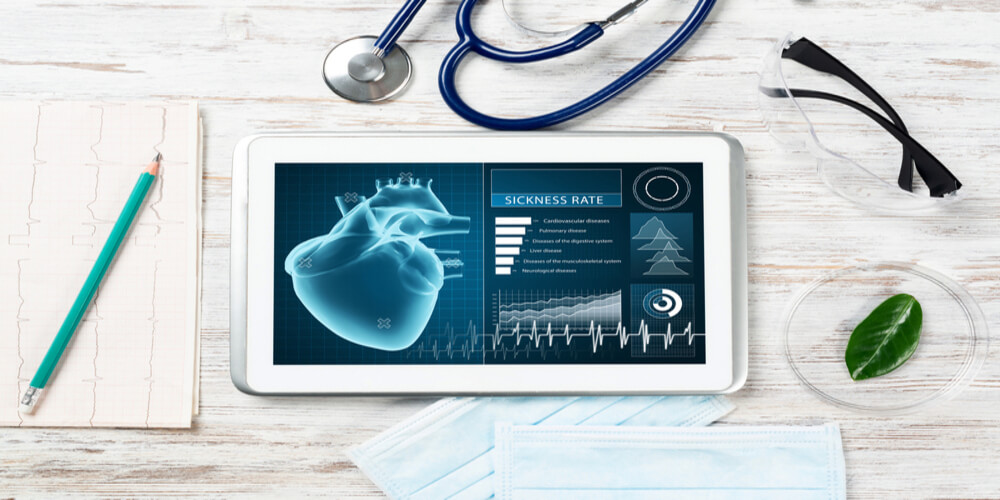
ISO 13485 medical devices standard is meant to specify the requirements for a QMS (quality management system) for manufacturers or suppliers of medical devices. Knowing the wide variety of medical items produced and used, the big question is which organizations need to achieve ISO 13485 requirements for quality assurance.
- Manufacturers who deal with designing and production of any type of medical device.
- Any companies that procure assemble, and distribute medical devices.
- Any company that repairs or services medical devices and provides related services.
Any organization that produces, sells, or services medical devices must follow a general framework approach for achieving ISO 13485, just like ISO 9001 or other ISO management standards. It needs to develop a QMS complying with specific standard requirements and implement it uniformly by engaging every staff member.
Each of the requirements is meant to regulate the lifecycle of medical devices and helps to ensure:
- Good practices for delivery of quality, resilient and effective devices.
- Management of risks making products’ uses safer.
- Improvement of manufacturing and testing procedures.
- Competitive advantages of your company in the industry.
ISO 13485 medical devices standard is formed explicitly for medical device manufacturers or suppliers, which helps them to control the entire lifecycle of devices— from designing, production, storage, distribution, and use for treatment.
The standard also enables organizations to have a quality management system to check non-conformities in their processes with medical industry regulations and ensure the effectiveness of their devices. Achieving it shows that they are committed to continual improvement, giving customers immense confidence while buying their products.
What is ISO 13485 Certification?
ISO 13485 Certification contains “requirements for a quality management system where an organization needs to demonstrate its ability to provide medical devices and related services that consistently meet customer and applicable regulatory requirements. Such organizations can be involved in one or more stages of the , including design and development, production, storage and distribution, installation or servicing of a medical device, and design and development of the provision of associated activities (e.g., technical support).”
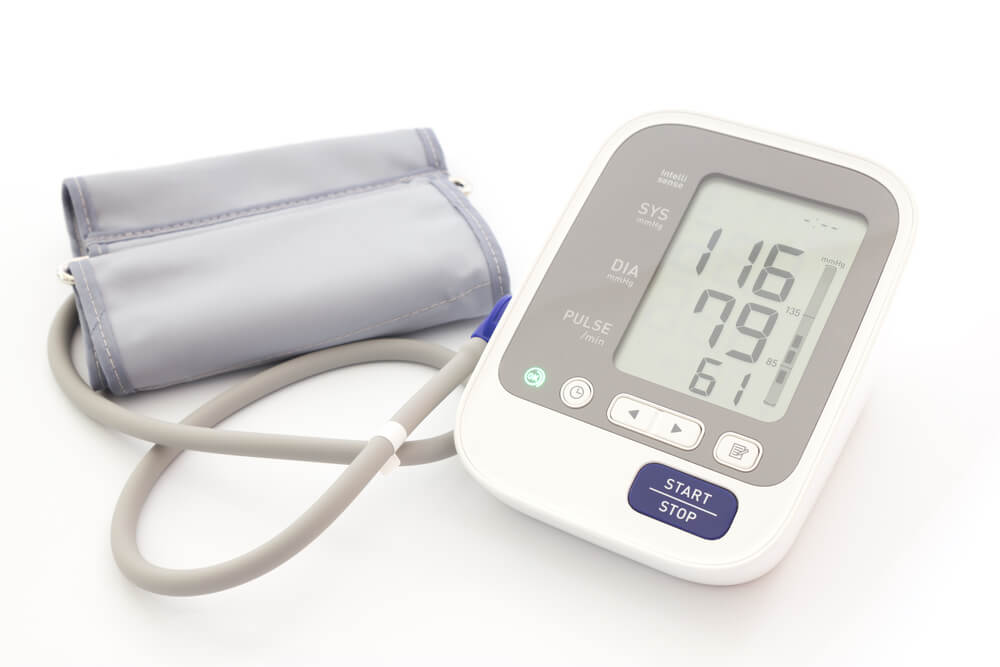
This standard can also be used by suppliers or external parties that provide a product, including quality management system-related services to such organizations.” Many organizations will be looking to diversify their manufacturing during this critical time. There is more demand for medical device manufacturing right now than manufacturing for other sectors. As a result, there are many similarities between ISO 9001 (and derivative standards) and ISO 13485.
What are the benefits of ISO 13485?
The global market of medical devices and products is quite evolving and competitive. Against such a backdrop, a medical device manufacturer or supplier that proves its compliance with the ISO 13485 standard can flourish in the market. A standard specifically designed for quality management of medical devices exhibits the manufacturer or supplier’s capabilities to provide safe and superior quality devices or products for medical purposes. The benefits of the 13485 standards are limited to the manufacturers, suppliers, and customers. These are the benefits that manufacturers and suppliers of medical devices can get after achieving the ISO 13485 Certification.
Benefits for Manufacturer
- New contracts and business opportunities.
- Financial savings due to higher revenue.
- Consistent improvements of facilities as well as products.
- Improved corporate reputation.
- Compliance with other legal and regulatory obligations.
Benefits for Suppliers
- Improved processes for packaging, testing, preservation, and sterilization.
- The traceability of the entire product development and supply procedure.
- It enhanced documentation and records of the feedback from personnel.
- Improved control of risks of contamination.
Benefits for Customers
- Products are safe and guarantee that customers meet the quality standards accepted worldwide.
- Medical devices used by health experts for diagnosis provide reliable results that help them decide on appropriate treatment procedures.
- Medical devices used by patients result in quicker recovery and improved wellbeing.
Though the ISO 13485 standard is voluntary for organizations, it could be a fruitful investment for medical device manufacturers. The manufacturers, their suppliers, and the customers can get various benefits due to compliance with the standard. If you own a medical device manufacturing company, then achieve the ISO 13485 to prove your company’s adherence to best industry practices and quality management methods. The standard can also bring your suppliers and customers to the forefront and help grow your business by winning their confidence.
ISO 13485 Certification: Who Needs it & Why?
Regarding quality assurance for medical device manufacturing companies, the ISO 13485 standard plays the most significant role. It lays down the key requirements for a quality management system (QMS) that assist a company in managing the processes of design, development, and distribution of medical products, parts, or interrelated components.
Getting ISO 13485 for medical devices quality management is a milestone achievement for manufacturers producing medical devices and related items or services. To get the ISO 13485 Certification, a medical device company needs a well-documented QMS that fully complies with the standard’s requirements.

Documentation Requirements for ISO 13485 Standard
Here are the essential ISO 13485 Requirements that must be documented, ensuring that a medical device organization is ready to earn the certification.
- A defined quality policy is a written format incorporating the quality objectives of the medical devices company. In this proper quality manual, the scope and quality control procedures of your QMS are to be described.
- A validated tool or software would assess or manage the designing, production, packaging, storing, transportation, installation, or servicing of final medical products.
- Written records of all quality management procedures, including risk assessed, corrective and preventive actions (CAPA) needed, and customer complaints and feedback.
- Proper records of auditing processes or management reviews, results of the studies, and major improvements are needed.
- Documentation of infrastructure requirements and supplier requirements is essential to ensure the quality of every process and end product.
- Documented procedures for employee training include steps or ways the medical devices company can make its employees or team members aware of their QMS processes.
When a company fulfills all these documentation requirements, it prepares for the unique ISO 13485medical devices certification. Documentation is always a meticulous, technical, and intricate process; in this case, there are vast requirements to meet by a medical devices company. Therefore, to achieve certification in one go and be prepared with every document, they can contact the TUV Austria Bureau of Inspection & Certification.
ISO 13485 Certification: Recent Improvements That You Need to Know
Critical improvements that the ISO 13485 Standard has undergone in its last revision are as follows:
- More comprehensive emphasis on manufacturing infrastructure, specifically in the case of input of sterile equipment or devices for surgical purposes. In other words, the standard has many additional requirements for the validation of pure items.
- Need for increased accuracy in fulfilling regulatory requirements, including documentation.
- Easier harmonization of validation requirements for quality assurance and other software applications used by medical device manufacturers.
- It encompasses other organizations or processes indirectly related to the manufacturing of medical devices. They include raw materials suppliers, parts or subassemblies, sub-contractors, logistics collaborators, repairing and maintenance agencies, and distributors.
- Additional regulations for designing and developing medical devices or equipment include robust planning, verification at each stage, and maintenance of all development processes.
- Certain guidelines for post-delivery and marketing activities include complaints handling risks reporting, etc.
- While this certification is a stand-alone quality certification for the medical device sector, its scope and approach are similar to a general quality management certification, i.e., ISO 9001.
ISO 13485 goes through major and minor revisions after specific periods. Therefore, it is a requirement for organizations to update their management system to acknowledge the changes in the standard.
3 Reasons Why ISO 13485 is Crucial for Your Medical Device Business
While medical device manufacturing emphasizes quality and safety, the ISO 13485 certification is needed by the industry’s manufacturers, suppliers, distributors, and service providers to ensure that. It helps them to meet all regulatory requirements and applicable statutory guidelines while ensuring the safety and quality of devices throughout the whole lifecycle.
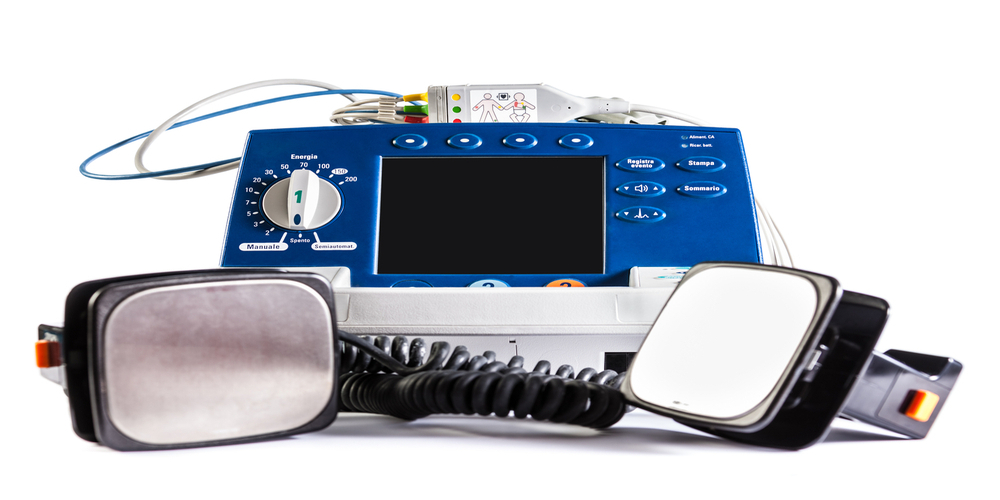
Besides underlining the critical requirements like risk management, documentation, records keeping, and design control, the ISO 13485 standard focuses on supplier control, outsourcing controls, and consistent management responsibility. In short, achieving the certification helps organizations fine-tune their devices, ensure reliability in use, and meet legal and industry specifications.
The ISO 13485 standard is needed by all types of medical device manufacturers or organizations related to the field for the following key reasons.
1). More Opportunities to Trade
Organizations using medical devices, such as hospitals, health research centers, clinics, and laboratories, always seek ISO 13485 certified suppliers to ensure they can provide quality and reliable patient services. Therefore, the certification is a great winning point for your business which helps in gaining contracts and remaining competitive.
2). Consistency in Quality
The safety of patients directly depends on the consistency of the medical devices used. If you are ISO certified, it demonstrates efforts to maintain the steadiness and competency of your products. Hence, you have more chances to sell your devices locally and globally.
3). Risk Management
As a quality management standard, ISO 13485 also underlines the principle of risk management like ISO 9001. It ensures that your organization has proactive practices to identify, access, mitigate or manage risks in the entire lifecycle of the devices so that the patient’s safety is not affected. This prevents any reputation damage or noncompliance cases in your organization.
The medical device sector is undoubtedly the most demanding and crowded sector, with millions of companies trying to make a mark. As the globally-recognized standard for medical device quality management, ISO 13485 is useful for your manufacturing or distribution business to beat the intense competition out there in the market. Achieving this international ISO 13485 certification could benchmark your devices’ quality performance and safety compliance and hence, help you thrive in the market.
What are the requirements of ISO 13485?
The ISO 13485 Certification in Pakistan sets the standards required for companies associated with the supply chain of medical devices to implement the ISO 13485 Quality Management System and meet its requirements. Adopting the ISO 13485 certification gives manufacturers a sensible foundation for dealing with the certification guidelines and various other policies and dedication to the safety and quality of medical devices.
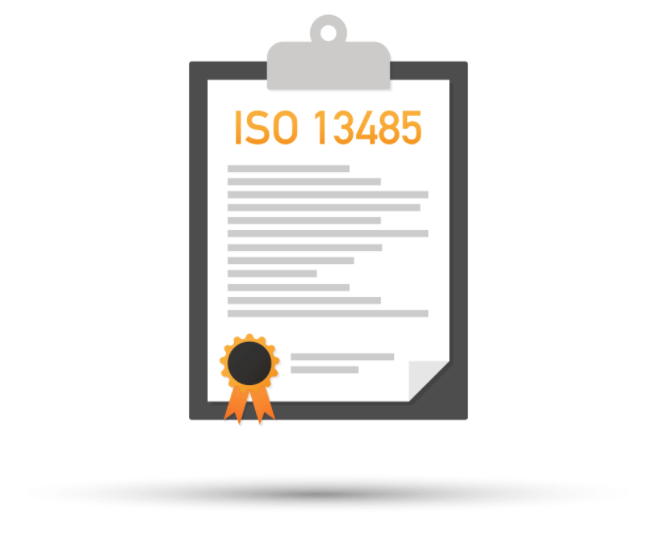
1. Quality Management System
This area talks about general QMS demands and the documentation demands of the ISO 13485 Certification standard. It consists of the quality requirements, Control of Documents, and Control of Records, all of which are required for records in the ISO Certification in Pakistan.
2. Management Responsibility
The management responsibility needs to cover the requirements for management to be crucial in the application and maintenance of the QMS. Along with preparation for the ISO 13485 Certification in Pakistan, there is a requirement for the leading administration to be associated with the ongoing testimonial of the system to make sure consumers’ satisfaction and improvement.
3. Source Administration
This section covers the necessity to manage all resources, including human resources, buildings, framework, and the workplace required for ISO 13485 Certification.
4. Product Understanding
Product requirements manage all aspects of the preparation and creation of the service of the product. This section includes planning, product requirements testimonial, style, buying, developing the product or service, and managing the devices used to keep an eye on and measure the service or product. ISO 13485certification in Pakistan allows for requirements to be excluded if they do not apply to the business.
5. Measuring, Evaluating, and Improving
This last section consists of the need to make sure that you can monitor whether your QMS is working well. It includes assessing consumer contentment, internal audits, monitoring product and processes, taking care of non-conforming products, and corrective and preventive actions for ISO 13485 Certification in Pakistan.
What are the clauses of ISO 13485?
ISO 13485 is a stand-alone QMS standard. It is derived from ISO 9000 quality management standard series. ISO 13485 was written to support medical device manufacturers in designing a QMS. The clauses of ISO 13485 Certification are:
How to get ISO 13485 Certificate?
ISO 13485 provides the requirements for a comprehensive management system. An organization can use it for the design, development, production, installation, and servicing of medical devices and the design, development, and provision of related services. You can get ISO 13485 certificate by following these steps.
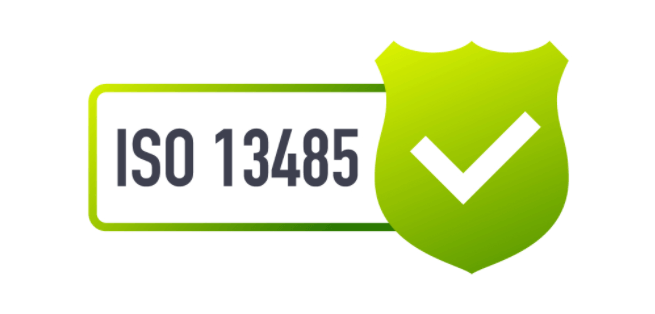
Step 1
Select an approved certification body like the TUV Austria Bureau of Inspection & Certification; then, you’ll get a Quotation from the Certification body.
Step 2
Once you’ve agreed on the quotation, the TUV Austria Bureau of Inspection & Certification assessment has been planned and done on the mutually agreed date. This assessment consists of two mandatory visits.
- Stage-1
- Stage-2
Please note that you must be able to demonstrate that your management system has been fully operational for a minimum of three months and has been subject to a management review and a full cycle of internal audits.
Step 3
After the successful audit, if all the given CAPA against the observation and NC are closed and accepted by the certification body. Then, you will receive a draft certificate, and after the organization’s acceptance, the certification body will issue the final certificate.
Certification is valid for three years and is maintained through annual surveillance audits and a three-year re-certification audit.
Conducting 13485 Audits during the COVID-19 Pandemic
We have the option of performing a stage 1 audit virtually, except for high-risk medical devices. Portions of stage 2 surveillance and re-certification audits can also be undertaken almost. TUV Austria Bureau of Inspection & Certification believes that tremendous benefit is gained from face-to-face interaction with clients.
- Entirely virtual audit post-pandemic is unlikely.
- Partially virtual audits can save clients’ money/improve auditors’ quality of life.
Why Choose Us?
Most companies worry about ISO Certification cost in Pakistan but let us tell you that ISO Cost in Pakistan is not what you should be thinking of because this certification can boost your organization’s process. We will ensure that the ISO cost in Pakistan is as minimal as possible.
To get your ISO Certification, We assure you 100% guarantee results, and we ensure that you will be certified because we have 100% success rates to date in getting our customers certified. So get in touch with us as soon as possible and get your ISO Certificate in Pakistan soon.
TUV Austria Bureau of Inspection & Certification has a huge umbrella of certification services, including:
- ISO 9001 – Quality Management System
- ISO 14001 – Environmental Management System
- ISO 45001 – Occupational Health & Safety Management System
- ISO 55001 – Asset Management — Management Systems Requirements
- ISO 27001 – Information Security Management System
- ISO 20000 – IT Service Management System
- ISO 22000 – Food Safety Management System
- HACCP – Food Safety Management System
- Halal Certification
- ISO 21001 – Educational Organizations Management System
- ISO 29990 – Learning Services Management System
- ISO 20121 – Sustainability Event Management System
- ISO 22301 – Business Continuity Management System
- ISO 37001 – Anti-Bribery Management System
- ISO 28000 – Supply Chain Security Management System
- ISO 39001 – Road Traffic Safety Management System
- ISO 31000 – Risk Management – Guidelines
- ISO 22716 – Good Manufacturing Practices for Cosmetics
FAQS
What does ISO 13485 mean?
ISO 13485 is a specific standard for Quality Management systems (QMS) in the medical devices industry. Achieving the ISO 13485 certification helps manufacturers and service providers in the medical device industry streamline their processes, minimize risks, and ensure the quality and safety of devices.
Why is ISO 13485 critical?
The following reasons explain why the ISO 13485 standard is essential for organizations dealing with medical devices:
- It firmly ensures the use of best practices throughout the production steps of medical devices.
- It serves as a framework for meeting your organization’s regulatory or legal requirements.
- It helps cut operations costs and enhance operational efficiency, enabling your organization to offer devices at reduced prices.
- The ISO 13485 standard lets you offer patients reliable and safe medical devices, ensuring their well-being and quicker recovery.
- It ensures the implementation of a QMS and its continual improvement n the long run; hence, you can consistently raise the quality of your devices.
- It gives your organizational recognition as a certified medical device supplier, so you get more opportunities for series.